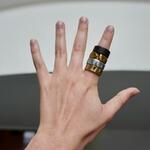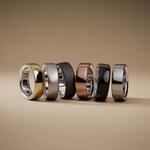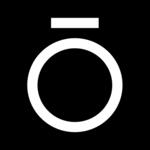Jeany|來非虛構小火堆玩吧
says
 The best smart rings of 2024: Expert tested and revi...比較厲害的好像是 Oura
The best smart rings of 2024: Expert tested and revi...比較厲害的好像是 Oura 智慧戒指有哪些優缺點?Oura Ring 實戴體驗分享|對於Apple Ring的期待好啦,有點滅火,主要是每次洗手都要拿下來也太麻煩了吧?
智慧戒指有哪些優缺點?Oura Ring 實戴體驗分享|對於Apple Ring的期待好啦,有點滅火,主要是每次洗手都要拿下來也太麻煩了吧?而且如果運動抓繩子抓槓什麼不好抓也不方便啊。是說這倒是可以戴手套啦。
目前感覺柔道課的時候如果能戴著測數據倒是感覺還是很可以考慮⋯不過每個月是要月費也太麻煩了吧。
Jeany|來非虛構小火堆玩吧
says
The downside, which Redditors and reviewers often point out, is that there's a $6 per month membership cost to unlock personal insights, like in-depth morning sleep analysis and temperature trend monitoring (which can even predict early stages of illness). Non-paying members only have access to sleep, readiness, and activity insights.
所以也不是一定要付月費嘛!
所以也不是一定要付月費嘛!
Jeany|來非虛構小火堆玩吧
says
Best Buy 就有耶,哈哈哈🤣
剛剛查了一下,似乎 apple ring 的謠言非常少。大概沒有要出?🤔
剛剛查了一下,似乎 apple ring 的謠言非常少。大概沒有要出?🤔
話說 apple watch 心跳有準嗎?我的 fitbit 我覺得瞬間心跳不準,怎麼都忍不住了心跳才 130?不排除我心肺就是這麼差啦

Jeany|來非虛構小火堆玩吧
says
CC_27: 我以前用過 peloton 附的心率帶,互相比較的感覺是,我覺得 Apple Watch 比它準。心率帶感覺位置一跑掉就整個超級不準的,所以誤差超大。
但 Apple Watch 和 Fitbit 誰比較準我就不知道了。我覺得這件事和手錶有沒有戴好也有關係。
我覺得你運動量蠻大的欸,不可能心肺功能差的啦,130不可能忍不住吧!所以我覺得是你的手錶討錢了XDDDD
但 Apple Watch 和 Fitbit 誰比較準我就不知道了。我覺得這件事和手錶有沒有戴好也有關係。
我覺得你運動量蠻大的欸,不可能心肺功能差的啦,130不可能忍不住吧!所以我覺得是你的手錶討錢了XDDDD
 Dexcom invests $75M in Ōura, agrees to integrate sma...看到這個新聞不知道會不會讓你有想買的衝動😆
Dexcom invests $75M in Ōura, agrees to integrate sma...看到這個新聞不知道會不會讓你有想買的衝動😆
Jeany|來非虛構小火堆玩吧
says
YKJL: 我剛剛還以為他們會做在一起,想說怎麼可能把 CGM 的探針戳到手指上XDDDD
但如果是App整合在一起就完全可以理解。
不過現在的CGM 太大了,而且我覺得膠讓我皮膚過敏的問題一時半刻很難解決(因為我一個長期使用的客人說他完全沒有這問題,所以應該是我的皮膚比較敏感吧),而且CGM太大了也不能柔道課帶著,免得一撞針就歪了,所以我對這一點還好~
但如果是App整合在一起就完全可以理解。
不過現在的CGM 太大了,而且我覺得膠讓我皮膚過敏的問題一時半刻很難解決(因為我一個長期使用的客人說他完全沒有這問題,所以應該是我的皮膚比較敏感吧),而且CGM太大了也不能柔道課帶著,免得一撞針就歪了,所以我對這一點還好~
Jeany|來非虛構小火堆玩吧
says
不過 CGM 如果支援 smart watch / smart ring 真的會很好,要不然之前我用 libre 3 ,只要手機放遠一點(像是隔壁房間)就收不到資料,也是蠻不方便的。
我現在正在用說,好巧。但才剛用,還不確定是不是適合我
但我真的就是為了偵測各種數據才買的XD
Jeany|來非虛構小火堆玩吧
says
sjs93901908: 那期待你的心得欸!!!
我才想說好像買了一個同溫層的人不會感興趣的東西,結果沒想到就看到你開了這串嚇我一大跳XDDD 目前為止是相當滿意,我感覺自從有壓力數值以後,我要判斷什麼事對我是好的(頭腦認為好的和身體認為好的)很不一樣,這很有趣。但再多就要繼續測試了
Jeany|來非虛構小火堆玩吧
says
sjs93901908: 咦,那你戴多久了?洗澡或洗手的時候你會拿下來嗎?
我戴了一週多還沒滿兩週,好像是。第一週有的數據比較有限,壓力值就好像是滿一週以後才冒出來的。最近則是還多出早期病症的偵測等等
我洗澡會拿下來充電,但我其實我一開始戴過它洗了一兩次也沒事。平常洗手不會拿,除非我要洗碗會把手搞得油油的(隱性潔癖的我),就會先摘下來放旁邊。我一開始蠻擔心洗手的,但目前測試好像都不會有什麼影響,至少我用的期間啦
之前讀Reddit討論區是有人分享,是做美髮業的,一天到晚要幫客人洗頭和噴東西,她也沒拿下來,目前都是沒有影響,使用感很正常
我考慮要Apple watch和Oura蠻久的,最後是想選完全沒有螢幕干擾的戒指型。本來有點擔心睡覺會不會有感覺,因為我是很敏感的體質戴手錶型和別的東西一定會睡不好。目前戴Oura最喜歡的就是睡覺完全沒感覺,一切正常。一覺醒來又可以等數據看,感覺很符合我的喜好
目前最愛看的就是壓力值,對於頭腦常判斷不出剛剛發生的事對我到底是壓力還是健康的參與蠻有幫助的。幫我弄清楚了不少日常活動到底對我的影響是什麼。雖然還沒進到根據這些觀察而改變日常的階段(才不到兩週嘛),但我感覺這對我日後要調整生活習慣會很有幫助
Jeany|來非虛構小火堆玩吧
says
Jeany|來非虛構小火堆玩吧
says
查了一下:
The Oura ring measures a variety of health metrics, including:
Heart rate: The Oura ring uses LEDs to measure your heart rate 24/7.
Blood oxygen: The ring uses red and infrared LEDs to measure your blood oxygen levels while you sleep.
Breathing: The ring uses LEDs to measure your breathing regularity and respiratory rate while you sleep.
The Oura ring measures a variety of health metrics, including:
Heart rate: The Oura ring uses LEDs to measure your heart rate 24/7.
Blood oxygen: The ring uses red and infrared LEDs to measure your blood oxygen levels while you sleep.
Breathing: The ring uses LEDs to measure your breathing regularity and respiratory rate while you sleep.
Jeany|來非虛構小火堆玩吧
says
Temperature: The ring uses a digital sensor to measure your temperature variations.
Activity: The ring uses an accelerometer to track your movement and activity 24/7.
Sleep: The ring provides sleep insights, including sleep duration and sleep quality.
Total burn: The ring calculates your total burn, or the number of calories you burn in a 24-hour period.
Activity: The ring uses an accelerometer to track your movement and activity 24/7.
Sleep: The ring provides sleep insights, including sleep duration and sleep quality.
Total burn: The ring calculates your total burn, or the number of calories you burn in a 24-hour period.
Jeany|來非虛構小火堆玩吧
says
Menstrual cycle: The ring can track your menstrual cycle.
The Oura ring uses this data to provide daily scores for sleep, activity, and "readiness". It can also help you determine your chronotype, which is your body's natural preferences for sleep or wakefulness.
The Oura ring uses this data to provide daily scores for sleep, activity, and "readiness". It can also help you determine your chronotype, which is your body's natural preferences for sleep or wakefulness.
Jeany|來非虛構小火堆玩吧
says
欸他怎麼測月經週期,看體溫嗎?
Jeany|來非虛構小火堆玩吧
says
Jeany|來非虛構小火堆玩吧
says
原來 Oura 4 根本就剛剛才release 的! Oura Ring. Smart Ring for Fitness, Stress, Sleep & H...
Oura Ring. Smart Ring for Fitness, Stress, Sleep & H...
 Oura Ring. Smart Ring for Fitness, Stress, Sleep & H...
Oura Ring. Smart Ring for Fitness, Stress, Sleep & H...
Jeany|來非虛構小火堆玩吧
says
話說我剛剛已經去 Best Buy 買了一個(欸)
但我本來想說馬上就可以戴了,殊不知他們只有 oura 3,4根本就沒有現貨,需要用寄的寄給我。
(但明天就寄到了啦)
結果原來是十月才剛剛上市的啊。
不過best buy 說服我加入 plus 會員,可以有 free shipping 和兩個月的退貨期,所以就想說可以試用看看啊。
殊不知,回到家發現溫尢說他已經是 Best Buy plus member 了!給best buy 多賺了$50
然後我還發現相較之下 Apple Watch 也太便宜,我以為是手錶更貴,結果差不多一樣貴欸。而且 apple watch 10 就有 crash detection 啊!
是否我價值觀壞掉XD
但我本來想說馬上就可以戴了,殊不知他們只有 oura 3,4根本就沒有現貨,需要用寄的寄給我。
(但明天就寄到了啦)
結果原來是十月才剛剛上市的啊。
不過best buy 說服我加入 plus 會員,可以有 free shipping 和兩個月的退貨期,所以就想說可以試用看看啊。
殊不知,回到家發現溫尢說他已經是 Best Buy plus member 了!給best buy 多賺了$50
然後我還發現相較之下 Apple Watch 也太便宜,我以為是手錶更貴,結果差不多一樣貴欸。而且 apple watch 10 就有 crash detection 啊!
是否我價值觀壞掉XD
期待你的心得啦!
Jeany|來非虛構小火堆玩吧
says
YKJL: 說不定用了沒幾天就跑去退貨了XDDDD
哈哈 這也是心得呀! 對於戴手錶覺得很麻煩或覺得不舒服的人應該很適合。我自己因為很愛用手錶的Siri、 還有遠端遙控手機的相機、還有ECG跟crash detection,應該是不會換成戒指。
Jeany|來非虛構小火堆玩吧
says
YKJL: 其實我沒有要換手錶欸,我打算兩個都繼續戴XDDDD
我只是覺得手錶太常需要充電(我猜和電池老化也有關係),所以感覺戒指可以輔助一下,尤其是像睡覺的時候。
當然還有就是我也還在醞釀柔道課的時候可以繼續戴戒指啦,因為確定是不能戴手錶。
但我剛剛發現你講的這些功能我都沒在用~(crash detection 是版本太舊沒有)每個人用的功能真的不一樣耶XDDDD
我只是覺得手錶太常需要充電(我猜和電池老化也有關係),所以感覺戒指可以輔助一下,尤其是像睡覺的時候。
當然還有就是我也還在醞釀柔道課的時候可以繼續戴戒指啦,因為確定是不能戴手錶。
但我剛剛發現你講的這些功能我都沒在用~(crash detection 是版本太舊沒有)每個人用的功能真的不一樣耶XDDDD
我都洗澡時充電,睡覺前就能充飽來偵測睡眠。
總之期待用的心得🥳
總之期待用的心得🥳
Jeany|來非虛構小火堆玩吧
says
Jeany|來非虛構小火堆玩吧
says
總之!期待明天收到新戒指!
一回神你就速速去買一個回來玩了,超神速XDD
也期待你的心得~
Jeany|來非虛構小火堆玩吧
says
sjs93901908: 衝動購物XD